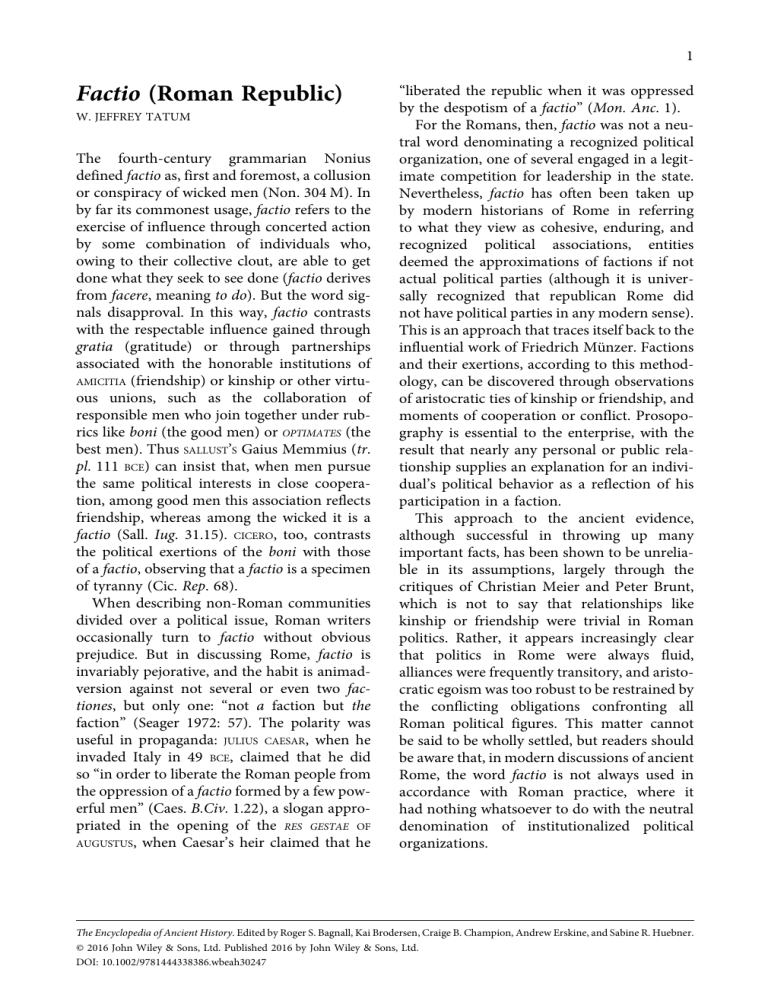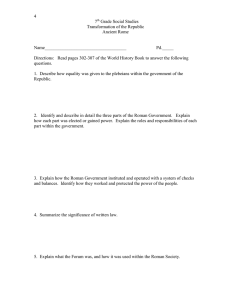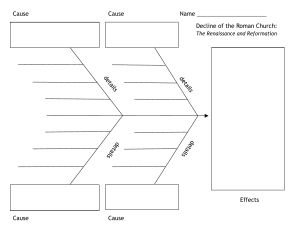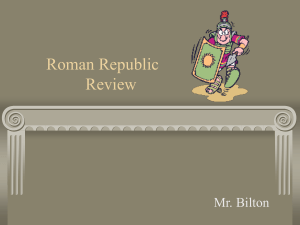
1 Factio (Roman Republic) W. JEFFREY TATUM The fourth-century grammarian Nonius defined factio as, first and foremost, a collusion or conspiracy of wicked men (Non. 304 M). In by far its commonest usage, factio refers to the exercise of influence through concerted action by some combination of individuals who, owing to their collective clout, are able to get done what they seek to see done (factio derives from facere, meaning to do). But the word signals disapproval. In this way, factio contrasts with the respectable influence gained through gratia (gratitude) or through partnerships associated with the honorable institutions of AMICITIA (friendship) or kinship or other virtuous unions, such as the collaboration of responsible men who join together under rubrics like boni (the good men) or OPTIMATES (the best men). Thus SALLUST’S Gaius Memmius (tr. pl. 111 BCE) can insist that, when men pursue the same political interests in close cooperation, among good men this association reflects friendship, whereas among the wicked it is a factio (Sall. Iug. 31.15). CICERO, too, contrasts the political exertions of the boni with those of a factio, observing that a factio is a specimen of tyranny (Cic. Rep. 68). When describing non-Roman communities divided over a political issue, Roman writers occasionally turn to factio without obvious prejudice. But in discussing Rome, factio is invariably pejorative, and the habit is animadversion against not several or even two factiones, but only one: “not a faction but the faction” (Seager 1972: 57). The polarity was useful in propaganda: JULIUS CAESAR, when he invaded Italy in 49 BCE, claimed that he did so “in order to liberate the Roman people from the oppression of a factio formed by a few powerful men” (Caes. B.Civ. 1.22), a slogan appropriated in the opening of the RES GESTAE OF AUGUSTUS, when Caesar’s heir claimed that he “liberated the republic when it was oppressed by the despotism of a factio” (Mon. Anc. 1). For the Romans, then, factio was not a neutral word denominating a recognized political organization, one of several engaged in a legitimate competition for leadership in the state. Nevertheless, factio has often been taken up by modern historians of Rome in referring to what they view as cohesive, enduring, and recognized political associations, entities deemed the approximations of factions if not actual political parties (although it is universally recognized that republican Rome did not have political parties in any modern sense). This is an approach that traces itself back to the influential work of Friedrich Münzer. Factions and their exertions, according to this methodology, can be discovered through observations of aristocratic ties of kinship or friendship, and moments of cooperation or conflict. Prosopography is essential to the enterprise, with the result that nearly any personal or public relationship supplies an explanation for an individual’s political behavior as a reflection of his participation in a faction. This approach to the ancient evidence, although successful in throwing up many important facts, has been shown to be unreliable in its assumptions, largely through the critiques of Christian Meier and Peter Brunt, which is not to say that relationships like kinship or friendship were trivial in Roman politics. Rather, it appears increasingly clear that politics in Rome were always fluid, alliances were frequently transitory, and aristocratic egoism was too robust to be restrained by the conflicting obligations confronting all Roman political figures. This matter cannot be said to be wholly settled, but readers should be aware that, in modern discussions of ancient Rome, the word factio is not always used in accordance with Roman practice, where it had nothing whatsoever to do with the neutral denomination of institutionalized political organizations. The Encyclopedia of Ancient History. Edited by Roger S. Bagnall, Kai Brodersen, Craige B. Champion, Andrew Erskine, and Sabine R. Huebner. © 2016 John Wiley & Sons, Ltd. Published 2016 by John Wiley & Sons, Ltd. DOI: 10.1002/9781444338386.wbeah30247 2 REFERENCES AND SUGGESTED READINGS Brunt, P. A. (1988) The fall of the Roman republic and related essays. Oxford. Hölkeskamp, K.-J. (2001) “Fact(ions) or fiction? Friedrich Münzer and the aristocracy of the Roman republic.” International Journal of the Classical Tradition 8: 92–105. Meier, C. (1980) Res Publica Amissa: Eine Studie zu Verfassung und Geschichte der späten römischen Republik, 2nd ed. Wiesbaden. Münzer, F. (1999) Roman aristocratic parties and families, trans. T. Ridley. Baltimore. German original: F. Münzer (1920) Römische Adelsparteien und Adelsfamilien. Stuttgart. Seager, R. (1972) “Factio: some observations.” Journal of Roman Studies 62: 53–8.




